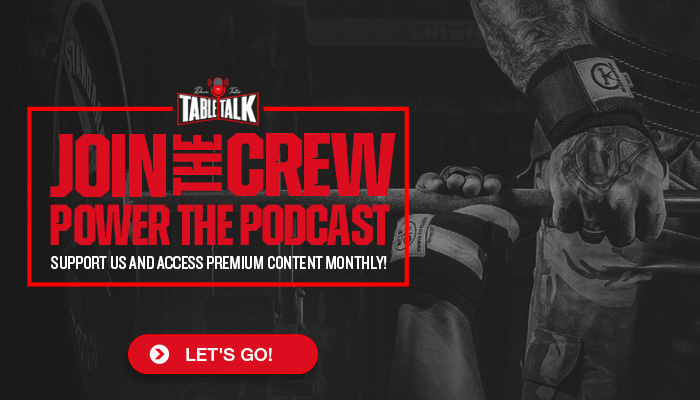
You know. I know. We've all heard the song and dance. You're PASSIONATE about bodybuilding, and you simply MUST be an online trainer because what you can provide to the online training community has not yet been offered by the other ten-thousand trainers floating around in this giant sea of turds. I have said it before and will say it again: the online world does not need another online trainer. However, I concede (for the sake of having a deadline I need to meet for this article) that you absolutely are the exception. Potential clients are waiting patiently for your offerings, gems of knowledge, vast experience (lol j/k), and wisdom (jajaja again, but in Spanish).
Now that I've offended most of you reading this, I will offer my wisdom and experience to help you understand what you need to focus on or what you have not been focusing on so you can climb the ladder of success in this industry. After twenty-four years (and counting) of online training that started when the message boards were in their infancy (yes, prior to social media), I've made a very good living as one of the original prep guys/nutritionists in the online community, so you might want to hear me out.
RECENT: Is Bodybuilding Better In 2025 Than It Was In The 80s?
The list of things I see so many trainers do wrong is endless. There are different methods or different approaches to being an online trainer, and then there are things that are just plain wrong and will keep you from climbing the ladder in the industry. I will give you my top ten list of things that, if you focus intently on and strive to master, you will have a much better chance of turning your little side hustle into a lucrative endeavor.
The first three things on my list should be obvious to anyone who is a trainer or wants to train people online at some point in the future. However, I will expound on those three things because these three topics are deeper and more nuanced than most people think. I will attempt brevity, but if you know anything about me at all, you know I'm quite verbose.
After the three more obvious points on my list, I will discuss the other seven that you likely haven't thought of or haven't given enough attention to, and they're huge. Any of the last seven on my list can break you, even if you master the first three. Remember, if you want to succeed and build a reputable business, you need to not just know how to train, diet, and advise on supplements but also have a basic understanding of business and be sensical.
My Top Ten List
#1: Results
This is a huge "duh," so I'm just pointing out that before anything else on the list, you need to be able to get results. Results are what people come to a trainer for in the first place. From there, you need to keep them as a client and have them support you as a trainer by utilizing and paying attention to the other nine things on my list.
#2: Experience
It's important for me to note that this is oftentimes one of the most skewed or misunderstood variables when it comes to online training. Five years of experience is better than two years, and ten years is better than five years. You could argue that some people learn more in a shorter amount of time, and I absolutely agree with you. For that reason, let's go with an arbitrary number of twenty years of experience. There are too many online trainers to count who have over twenty years of experience. Placing fifth at a novice show and training for four years is hardly what anyone would consider "experience" in this field, and yet these qualifications make up more than fifty percent of online trainers.
Ask yourself this: how many different variables, situations, obstacles, or hurdles has a trainer of twenty years seen with clients? Now, compare that to what you have seen with clients. If you're being honest, you likely will admit that there are far more trainers out there who are more qualified than you. That being said, I doubt you'll stop anytime soon.
You need to understand that if your client has unique circumstances, you are almost certainly not the trainer for them. Do the responsible thing and pass that client on to someone more qualified. I have a lot of respect for the small percentage of online trainers who will admit when a client or situation is outside of their wheelhouse. Most trainers will see a potential client and "give it their best shot." Horrible idea.
#3: Name/Brand Recognition
If you have a business, you have a brand, whether you know it or not. Your name is your brand. TEAM SKIP is my brand. Quick little test: Google your name and then Google TEAM SKIP. My SEO position and depth go for pages upon pages. Not only does it go for pages, but it goes back for over twenty years. What does that say? It says staying power. It says reliability. And you will be hard-pressed to find anything negative at all in any search you do on my name or my brand. The exception might be my high-school girlfriend's husband. From what I understand, he's not a big fan of mine.
My point is that a potential client has very little background on who you are, what you know, whether you know anything at all, or if you're just some random person they saw with a better-than-mediocre physique, and they reach out to see if you are an online trainer. How or why a potential client would seek out a trainer this way is beyond me, but we all know this is not uncommon. On the other hand, I've had a few people reach out to me after seeing a picture of my physique on social media, and they ask if I'm a trainer. Apparently, they didn't bother to check the bio or any other obviously related information on my social media. My response to them? No. Why? Because I don't want anyone coming to me after I've established my brand for this long, not knowing how good I am at what I do.
In short, find a way to get your brand recognized, promoted, and exposed.
Now that we have the three main points out of the way, it's time to dig into the other seven that can make or break you, and you likely are not aware of all of them.
#4: Respect
I said "peers," not clients. Clients will respect you as soon as you know three more things than they do, and that's not always very hard to do. This is especially true if a client is working with you without any knowledge of what you know, your limited history of experience, or if they're your friend or another friend who referred them to you. Keep in mind that our friends always think we got robbed when we placed fifth at a show. These are the same friends supporting your business endeavor, so keep that in mind. They likely don't know shit.
When you are respected by your peers, you get referrals from other respected trainers. Sometimes, they can't handle any more clients, and they want to point a client in a direction where they know that the client will be taken care of. Other times, a client might not be a good fit for that trainer, and they direct that client to you because they feel that client would be in your wheelhouse. When your peers respect you, you can then feel like you have arrived on the scene and actually belong in the industry as a trainer.
#5: Rapport and Relationships
This is a big one and the one most often missed, even by veteran online trainers. There are essentially two styles of training people online:
- Train a high-volume client base with limited interaction while focusing exclusively on results only.
- Train a lower-volume client base focusing just as much on results as building relationships and rapport with your clients.
Though both are viable options, Option B is far superior, and it's the option that the majority of clients prefer. I've worked with thousands of clients since 2001, and this is the feedback that I've received. Even without direct feedback, it is evident that Option B provides significantly better client retention. I will get to that point in a minute.
Clients want to know that you understand their needs, sympathize with their struggles day-to-day (and the stresses of life), and the majority want to build a relationship with you if they feel they can trust you. Make no mistake, feigning sincerity will get you nowhere. Clients will see through you like you are made of glass.
#6: Client Retention
Anyone in any business will tell you matter-of-factly that long-term relationships with clients are vastly superior to client turnover. Results are important, but with the number of trainers in the industry, results are a given. It's what you do above the results that will retain clients and have clients recommend you, talk about you on social media, and refer others to you.
I would prefer to work with ten clients for four years rather than forty clients over four years. Any trainer would understand better how ten clients respond than forty. Every time you get a new client, you need to learn how that client responds to specific changes in diet, training, and supplementation, and that takes time. The longer you work with a client, the more likely they are to continue to work with you because you have built a relationship with them.
#7: Integrity, Professionalism, Ethics
How you treat your clients will impact every aspect of your business, and this is especially true in the age of social media. If you tell a client to kiss your ass, they're going to tell anyone and everyone about it. If you don't treat someone with respect or you belittle someone because they can't remain consistent, people will hear about it. I recall a trainer years ago (a friend of mine) who posted on social media that he was mad that a client reached out to him while he was "with his girl at the movies." That client is PAYING you for a service, and they don't know your schedule. Complaining about it on social media is nonsensical and a poor business decision. Other people saw his comment, and I am quite sure they did not side with him (the trainer). Hopefully, he realized that was a horrible business decision at some point. Otherwise, he has cost himself a lot of business (and business equals $$) over the years.
Clients need to trust that you will deliver when they send you funds for your service without ever meeting you face-to-face. If you're charging $300, that might be a risk someone is willing to take, but no one is sending you $1200 to $3000 if they can't count on you being a person with integrity and someone they can trust to deliver the service they are paying you for.
#8: The Minutiae Matters
The longest I will take to respond to a client is twenty-four hours. No one cares that you are on vacation if they are paying you for a specific length of time. I remember being absolutely exhausted when we took the kids to Disney for a week from Christmas to New Year back in 2011. I still had five hours of client work to do every night while the rest of my family was sleeping. I always remind myself that if I'm not going to provide a top-tier service, someone else will. I also put myself in the position of the client, and I ask myself, "What would I want from a trainer if I were the client?
If something weird comes up, and you want time off, at the very least, you need to compensate for the amount of time you are not going to be responding and add that time to the end of their consult. If they are a competitor, there is zero excuse outside of something catastrophic. There is way too much on the line for a client who is competing.
Never discourage clients from asking questions. They are not just paying you for results, but they are paying you for your knowledge and experience. If you can't explain why you want them to do something, you shouldn't be asking them to do it. You're lazy if you can explain the answer but don't want to take the time. Good trainers will explain and answer questions. That's yet another reason why I cost more than $300.
If your clients are a nuisance or a bother, you're too focused on the money. If money is your main motivation, you're already in trouble. Take care of your clients by providing a top-tier service; the money will take care of itself.
#9. Don't Cherry Pick Your Clients
This has always been a pet peeve of mine. You can easily look like a top trainer if you only work with and showcase those clients who can very easily get into top condition. I might not always have competitive clients who will blow away people with their condition in pictures, but I also have clients who have worked with other top prep guys with very little success, and when they come to me, they end up in their best condition. At the end of the consultation, the client is the one who has to be happy with their progress and success because they have to decide whether they are going to continue working with me. Again, that's called client retention.
The other drawback to cherry-picking your clients is that you're rarely going to be challenged by unique variables. Good luck learning anything new if you aren't challenged by unique variables as a trainer. Some people can get into excellent condition without doing everything correctly. I've had gifted clients in the past who can blow off their diet once a week and still destroy the competition, while the rest of us mere mortals have to adhere to the plan 100% to even win.
Can you spot a food allergy? Can you see visual cues in a physique when hormone levels aren't optimized? Do you know how to optimize someone's health when they are willing to take risks with compounds they are using? IBS? Celiac Disease? Autoimmune issues? You're not expected to be a doctor, but experience will provide insight into a lot of things that new trainers have no clue about and have never seen in a client before.
#10: Price Point
Get what you're worth, but be realistic about what you're worth. You don't get to dictate how much you're worth; your clients do. They will either pay you for your service because they find value in it, or they will think it's too expensive. Here's the caveat: If you don't charge much, you're not worth much. At least you realize that, and if you are being realistic, that's fair. I won't argue with you. Just don't be that guy who gets frustrated if you set your fees high and no one is willing to pay. If they aren't paying, you aren't worth it. It's that simple.
In retrospect, this article could sound like an ad for TEAM SKIP. That was not at all my intent. The article's point is to contrast new trainers versus veteran trainers who have seen it all and trained clients for decades. I'm the latter, and my contact information is ...
Just kidding.
As fate would have it, many people work with a new trainer first to save some money, and then they reach out to someone like me, saying, "I was going to contact you first, and I wish I had…" It's your decision who you work with. Do your due diligence.
For the trainers that I just spoon-fed:
You're welcome because I had absolutely no obligation to provide that information, but I did it anyway. It's just another aspect of a good trainer who is invested in this industry. We provide a ton of free information that does not directly provide any monetary gain. So, get to work and start providing free content so that potential clients can decide whether you know what you're talking about or not. Consider that an honorable mention for my top-ten list—Just Sayin'.
Ken “Skip” Hill has been involved in the sport of bodybuilding for almost 40 years and competing for over 20 years. Born and raised in Michigan, he spent 21 years calling Colorado home with his wife and their four children. Four years ago, he and his wife traded the mountains for the beach, relocating to South Florida. His primary focus is nutrition and supplementation, but he is called upon for his years of training experience, as well. He started doing online contest prep in 2001. He is considered one of the original contest prep guys when the bodybuilding message boards were still in their infancy. Skip’s track record with competitive bodybuilders is well-respected, and he also does sport-specific conditioning, including working with professional athletes.











